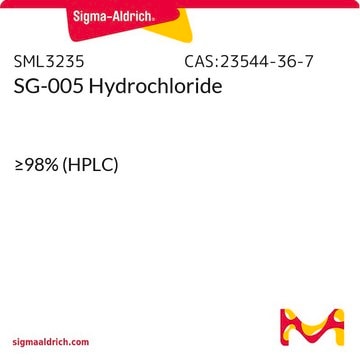SML3700
TPC2-A1-P
≥98% (HPLC)
Synonym(s):
5-(5-Bromo-2-(trifluoromethoxy)phenyl)-1-(cyclohexylmethyl)-2-methyl-1H-pyrrole-3-carboxylic acid, TPC2 agonist H07
Sign Into View Organizational & Contract Pricing
All Photos(2)
About This Item
Empirical Formula (Hill Notation):
C20H21BrF3NO3
CAS Number:
Molecular Weight:
460.28
MDL number:
UNSPSC Code:
12352200
NACRES:
NA.21
Recommended Products
Quality Level
Assay
≥98% (HPLC)
form
powder
color
white to beige
solubility
DMSO: 2 mg/mL, clear (Warmed)
storage temp.
2-8°C
Biochem/physiol Actions
TPC2-A1-P is a selective two pore segment channel 2 (TCP2) agonist that mimics the action of PI(3,5)P2 where it preferentially induces Na+ signals (EC50 = 0.6 µM). In contrast, TPC2-A1-N is a much weaker Ca2+ current inducer when compared to NAADP and TPC2-A1-N. TPC2-A1-P, but not the Ca2+ signals agonist TPC2-A1-N, activates TPC2-dependent lysosomal exocytosis (30 µM, murine macrophages), while TPC2-A1-N, but not TPC2-A1-P, causes TPC2-dependent alkalinization of lysosomal lumen Ca2+ stores (10 µM, TPC2-expressing HeLa cells).
Storage Class Code
11 - Combustible Solids
WGK
WGK 3
Flash Point(F)
Not applicable
Flash Point(C)
Not applicable
Certificates of Analysis (COA)
Search for Certificates of Analysis (COA) by entering the products Lot/Batch Number. Lot and Batch Numbers can be found on a product’s label following the words ‘Lot’ or ‘Batch’.
Already Own This Product?
Find documentation for the products that you have recently purchased in the Document Library.
Gene editing and synthetically accessible inhibitors reveal role for TPC2 in HCC cell proliferation and tumor growth
Cell Chemical Biology, 28(8) (2021)
Philipp Rühl et al.
Scientific reports, 11(1), 8313-8313 (2021-04-17)
The cation channel TRPML1 is an important regulator of lysosomal function and autophagy. Loss of TRPML1 is associated with neurodegeneration and lysosomal storage disease, while temporary inhibition of this ion channel has been proposed to be beneficial in cancer therapy.
Marco Keller et al.
Beilstein journal of organic chemistry, 17, 2716-2725 (2021-11-23)
We present a systematic investigation on an improved variant of the N-acyl-Pictet-Spengler condensation for the synthesis of 1-benzyltetrahydroisoquinolines, based on our recently published synthesis of N-methylcoclaurine, exemplified by the total syntheses of 10 alkaloids in racemic form. Major advantages are
Ponsawan Netcharoensirisuk et al.
Scientific reports, 11(1), 8515-8515 (2021-04-21)
Two-pore channel 2 (TPC2) resides in endolysosomal membranes but also in lysosome-related organelles such as the melanin producing melanosomes. Gain-of-function polymorphisms in hTPC2 are associated with decreased melanin production and blond hair color. Vice versa genetic ablation of TPC2 increases
Wei Xiong Siow et al.
Journal of cell science, 135(6) (2022-03-12)
Liver cancers, including hepatocellular carcinoma (HCC), are the second leading cause of cancer death worldwide, and novel therapeutic strategies are still highly needed. Recently, the endolysosomal cation channel TRPML1 (also known as MCOLN1) has gained focus in cancer research because
Our team of scientists has experience in all areas of research including Life Science, Material Science, Chemical Synthesis, Chromatography, Analytical and many others.
Contact Technical Service







